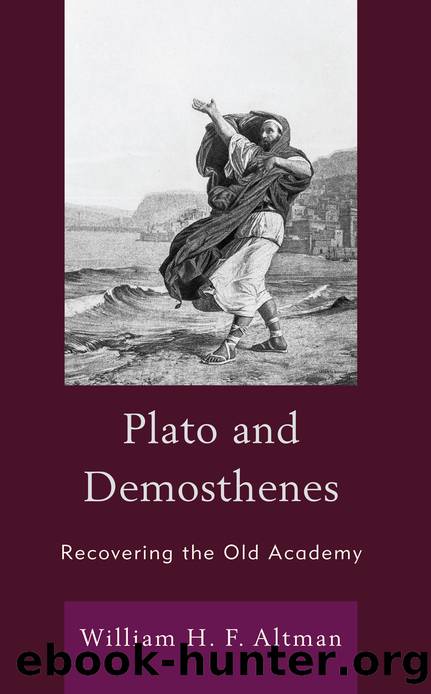Plato and Demosthenes by William H. F. Altman;

Author:William H. F. Altman;
Language: eng
Format: epub
Publisher: Rowman & Littlefield Publishing
Published: 2022-10-20T00:00:00+00:00
5
Suppressions
Thanks to creative ingenuity, a wonderful sense of humor, and Platonic inspiration, [Lucian] made a perfect decision: he found a way to make Demosthenesâ open enemies praise him, and made the agent sent to capture him tell the story of his heroic death. An imaginary dialogue between Antipater and the agent tasked with bringing Demosthenes to Macedon not only allows the latter to describe how Demosthenes cheated capture by committing suicide but more importantly gives Antipater the opportunity to narrate several speeches of Philip within this dialogue, allowing the latter to describe what made his most dangerous enemy so dangerous, and thus to offer him the kind of praise that only an enemy could. Just as the most devastating and persuasive critique of Demosthenes must come from a self-professed friend of liberty,1 so too must the highest possible praise come from freedomâs open foe. So perfectly Platonic is this Encomium of Demosthenes that no Platonist will be surprised to learn that the dialogueâs authenticity has been denied, and indeed that âits lack of inspirationâ2 has led to this result.3 It is better understood as a masterpiece, inspired by Platoâs playfulness.4 The allegedly Macedonian source of this praise is imaginary but the praise itself is Lucianâs own.5 By expressing the highest possible praise for Demosthenes, it leads the sympathetic reader to draw for themselves the only possible conclusion: that [Lucian] knows that Demosthenes was first and foremost Platoâs student, and that this explains Antipaterâs role, Philipâs praise, Demosthenesâ greatness, and the authorâs Platonic tricks.
The foregoing account fails to do justice to the complexity of Lucianâs dialogue. It revolves around an unnamed narrator and orator who is at a loss about how to properly praise Demosthenes on the anniversary of his death.6 Conversation begins when a poet named Thersagoras encounters him, determined to make him an audience for his verses, inspired by Homer, composed the night before (1). Lucian does not ask us to join the narrator in listening to these verses (25 â 26); after reciting them, Thersagoras takes the narrator to his house and gives him a hard-to-find book from the Macedonian archives (27)âof course no such book existsâthat contains the dialogue between Antipater and Archias (28â49) that contains within it a narrated dialogue between Philip and Parmenio (33 â 34), three more speeches about Demosthenes by Philip (35 â 37, 38, and 39), and a written record of Demosthenesâ last words made by the agent Archias (44â49). The second half of the dialogue imagines the narrator, having returned home, reading this book aloud to us; Thersagoras has disappeared. But the poet dominates the dialogueâs first half, explaining to the narrator how much easier it is to praise Demosthenes than Homer (9 â 21). He begins with a comparison of Homer and Demosthenes (5â8), demonstrating a detailed knowledge of both, and emphasizing the oratorâs variety (6). But what makes praising Demosthenes easier is our detailed knowledge of his life and character, and it is only an embarrassment of riches that makes offering him suitable praise difficult.
Download
This site does not store any files on its server. We only index and link to content provided by other sites. Please contact the content providers to delete copyright contents if any and email us, we'll remove relevant links or contents immediately.
The remains of the day by Kazuo Ishiguro(8969)
Tools of Titans by Timothy Ferriss(8365)
Giovanni's Room by James Baldwin(7325)
The Black Swan by Nassim Nicholas Taleb(7106)
Inner Engineering: A Yogi's Guide to Joy by Sadhguru(6785)
The Way of Zen by Alan W. Watts(6600)
Asking the Right Questions: A Guide to Critical Thinking by M. Neil Browne & Stuart M. Keeley(5757)
The Power of Now: A Guide to Spiritual Enlightenment by Eckhart Tolle(5749)
The Six Wives Of Henry VIII (WOMEN IN HISTORY) by Fraser Antonia(5496)
Astrophysics for People in a Hurry by Neil DeGrasse Tyson(5182)
Housekeeping by Marilynne Robinson(4436)
12 Rules for Life by Jordan B. Peterson(4299)
Double Down (Diary of a Wimpy Kid Book 11) by Jeff Kinney(4261)
Ikigai by Héctor García & Francesc Miralles(4246)
The Ethical Slut by Janet W. Hardy(4242)
Skin in the Game by Nassim Nicholas Taleb(4237)
The Art of Happiness by The Dalai Lama(4125)
Skin in the Game: Hidden Asymmetries in Daily Life by Nassim Nicholas Taleb(3989)
Walking by Henry David Thoreau(3952)
